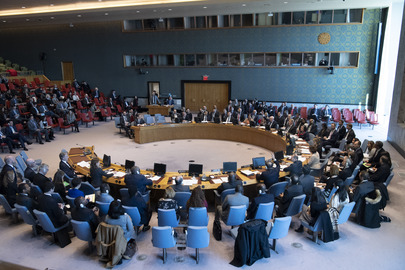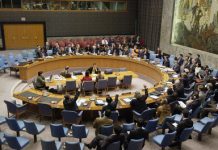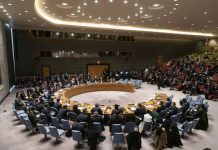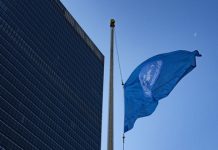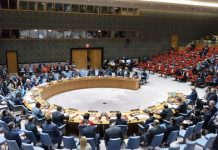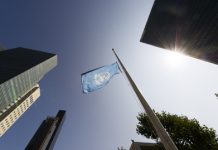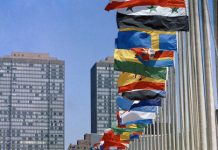Syria escalation: more than 280,000 uprooted in a matter of days
More than 280,000 people have been uprooted in northwest Syria in a matter of days, following the sudden and massive offensive into Government-controlled areas led by the extremist non-State armed group, Hayat Tahrir al-Sham, or HTS.
Aid has continued to flow from Türkiye across three border crossings into the embattled northwest and the UN World Food Programme (WFP) said that it had opened community kitchens in Aleppo and Hama – cities now reportedly occupied by HTS fighters.
WFP’s Samer AbdelJaber warned that around 1.5 million people are likely to be displaced by this latest escalation:
“It’s at a breaking point at the moment in Syria, after 13 or 14 years of a conflict, over three million Syrians are severely food insecure and cannot afford enough food, and malnutrition is at global levels – emergency levels – a total of 12.9 million people in Syria were classified as food insecure and needed food assistance before the recent crisis. So that’s why it’s another call for support for funding to all the organizations and humanitarians working across and all over Syria.”
Syria’s civil war began in 2011, sparked by a civil uprising against the Government. Since then, it has drawn in regional and international powers and defied the efforts of the Security Council and wider global community to bring it to an end.
In a related development, a new report published by a top independent rights panel appointed by the UN General Assembly highlighted widespread and systematic torture of opponents to Syria’s President Bashar al-Assad.
The International, Impartial and Independent Mechanism investigated violations across more than 100 Government detention facilities in Syria.
Head of the probe, Robert Petit, said that records of hundreds of former detainees – corroborated by forensic medical evidence – revealed how severe mental and physical harm was inflicted intentionally.
Former detainees described severe physical and psychological abuse, including beatings, being forced into stress positions and sexual violence.
They reported horrific conditions, insufficient food and water, overcrowding and the denial of medical care. Many witnessed other detainees being tortured and killed.
No evacuation order given before Kamal Adwan Hospital strike, says WHO
One of the last partially functional health centres in besieged northern Gaza was hit several times overnight into Friday, leaving four health workers among the casualties and the dead, the UN health agency has said.
Dr. Rik Peeperkorn, the World Health Organization Representative for the Occupied Palestinian Territory, cited reports of “heavy bombing” around Kamal Adwan Hospital.
He said that an Israel Defense Forces (IDF) tank was seen outside the hospital at around 4am, while people were told to move out of the health centre.
“There was no official evacuation order,” he maintained, but instead, rumours and panic:
“People started to climb the wall to escape, and this panic attracted IDF fire. There’s reports of deaths and arrests.”
Dr Peeperkorn noted that very few aid deliveries and emergency health teams have reached Kamal Adwan Hospital since the beginning of the Israeli military operation in Gaza’s far north, in early October.
This has left the facility without critical reserves, including fuel.
Since October 2023, 58 per cent of the 273 UN health agency’s missions inside Gaza have been either denied, cancelled or impeded.
WHO infection control experts rush to DR Congo to probe mystery illness
To the Democratic Republic of the Congo, DRC, where UN infection control experts have been deployed to help investigate a mystery illness that has left 30 people dead, out of nearly 400 confirmed cases.
Symptoms include headaches, coughing, fever, breathing difficulties and anaemia, but the World Health Organization – WHO – said that laboratory testing is needed to determine the cause of the illness.
The infection surfaced in Panzi, a remote locality in Kwango province in the southwest of the country, hundreds of kilometres from the capital Kinshasa.
Access by road is difficult and so far, the disease has been reported in seven of Kwango province’s 30 health zones. A respiratory disease such as Influenza or COVID-19 is being investigated as a possible cause, as well as malaria and measles.
The WHO experts – who include epidemiologists and infection prevention and control officers – will join DR Congo’s National Rapid Response Team.
A local UN health agency team has already been supporting the health authorities in Kwango province since the end of November to reinforce disease surveillance and identify cases.
Daniel Johnson, UN News
Music composed and produced by Joachim Harris. All rights reserved
Source of original article: United Nations (news.un.org). Photo credit: UN. The content of this article does not necessarily reflect the views or opinion of Global Diaspora News (www.globaldiasporanews.com).
To submit your press release: (https://www.globaldiasporanews.com/pr).
To advertise on Global Diaspora News: (www.globaldiasporanews.com/ads).
Sign up to Global Diaspora News newsletter (https://www.globaldiasporanews.com/newsletter/) to start receiving updates and opportunities directly in your email inbox for free.


